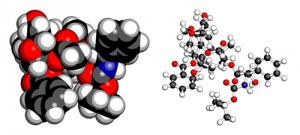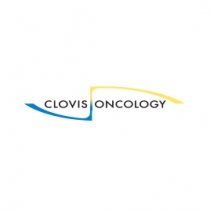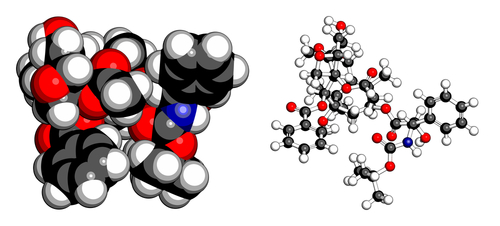 Patients with non small cell lung cancer (NSCLC), the most prevalent form of lung cancer, face a dismal five-year survival rate of less than 5%. Almost 85% of the 1.7 million new cases of lung cancer reported each year are NSCLC, and 10-15% of these patients will have an epidermal growth factor receptor (EGFR) activating mutation. Although patients with EGFR activating mutations show a significant tumor response to the first-generation EGFR inhibitors Tarceva and Iressa, 60% of patients will acquire a second “gatekeeper” mutation known as T790M, rendering the current treatment options useless.
Patients with non small cell lung cancer (NSCLC), the most prevalent form of lung cancer, face a dismal five-year survival rate of less than 5%. Almost 85% of the 1.7 million new cases of lung cancer reported each year are NSCLC, and 10-15% of these patients will have an epidermal growth factor receptor (EGFR) activating mutation. Although patients with EGFR activating mutations show a significant tumor response to the first-generation EGFR inhibitors Tarceva and Iressa, 60% of patients will acquire a second “gatekeeper” mutation known as T790M, rendering the current treatment options useless.
To address this issue, Clovis Oncology, Inc., a biopharmaceutical company that develops and commercializes innovative cancer treatments, is developing a drug called CO-1686. CO-1686 is a targeted irreversible inhibitor that is able to bind to EGFRs with either initial or T790M mutations but not to normal EGFRs. The drug is currently in Phase 2 trials to treat NSCLC patients with activating EGFR mutations who failed to see a response from initial EGFR-directed therapy and have the T790M mutation.
 Clovis just received Breakthrough Therapy Designation for CO-1686 from the Food and Drug Administration (FDA). This new designation will enable Clovis to expedite the development process because CO-1686 has shown substantial improvements in treating life-threatening medical conditions as compared to available therapies. The FDA’s decision was made based on interim efficacy and safety results from the Phase 1/2 trial that were presented at the 4th European Lung Cancer Conference in Geneva.
Clovis just received Breakthrough Therapy Designation for CO-1686 from the Food and Drug Administration (FDA). This new designation will enable Clovis to expedite the development process because CO-1686 has shown substantial improvements in treating life-threatening medical conditions as compared to available therapies. The FDA’s decision was made based on interim efficacy and safety results from the Phase 1/2 trial that were presented at the 4th European Lung Cancer Conference in Geneva.
“We very much appreciate this designation by FDA, which recognizes the meaningful benefit CO-1686 may provide patients with T790M positive NSCLC,” said Patrick J. Mahaffy, President and CEO of Clovis, in a news release. “This designation is well timed for us as well, as the increased interaction with FDA that it provides will come as we are initiating our registration studies and preparing to submit our initial New Drug Application by mid-2015.”
So far, an objective response rate of 64% (14 out of 22) has been observed in patients treated with CO-1686, and only one patient discontinued treatment due to adverse events. The next results update is expected in late May during the 2014 American Society of Clinical Oncology Annual Meeting. In addition to the Phase 1/2 trial, another Phase 2 trial is currently enrolling, which will continue to provide data for Clovis’s New Drug Application submission.

